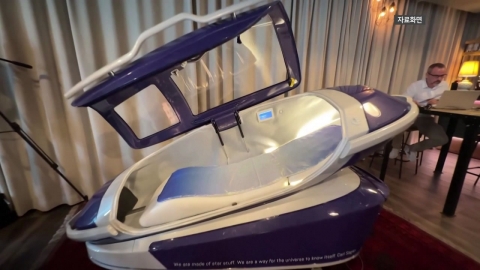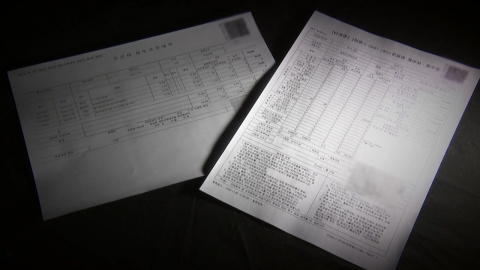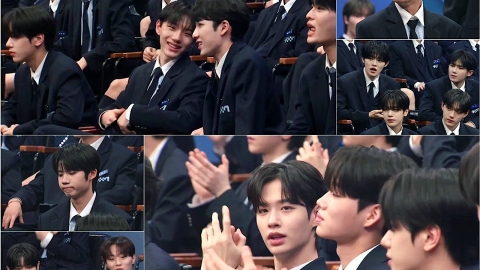■ Starring: Cho Han-beom, chair researcher at the Korea Institute for Unification,
* The text below may differ from the actual broadcast content, so please check the broadcast for more accurate information. Please specify [YTN Newswide] when quoting.
[Anchor]
Not long ago, foreign media reported that U.S. President-elect Trump is discussing ways to push for direct talks with North Korean leader Kim Jong-un. Attention is focusing on whether major issues between North Korea and the United States, such as the denuclearization of the Korean Peninsula, will face a new era with such a move. Let's take a closer look at the contents with Cho Han-beom, a chair researcher at the Korea Institute for Unification. Is the researcher here?
[Cho Han-beom]
How are you?
[Anchor]
Not long ago, Trump will send a personal letter to Kim himself after taking office, even suggesting a summit, these observations are coming out, what do you think?
[Cho Han-beom]
First of all, it's an observation, not what Trump himself said. However, during the presidential campaign, I talked about relations with North Korea and relations with Kim Jong-un several times, and from various perspectives, it is possible. However, observation is the most important thing in U.S. foreign affairs and security, Europe, followed by the Middle East, and the Korean Peninsula. So, there were some observations that the Russian War, the Middle East, and then North Korea would be dealt with. However, it seems that the Russian War is expanding, but if you look closely, you can see such an intention to secure territory as much as possible before Trump's inauguration and January 20. So there's already Trump influence. The Middle East also seems to be affected by Trump's election. Then, what's coming out now is about my aides and people around me. Then, isn't President Trump thinking of solving the triple crown, namely the Russo-War, the Middle East, and the Korean Peninsula at the same time? If Europe and the Middle East stabilize faster than expected, there are signs that the trend will change in this way, saying that they can access the North Korean issue much faster.
[Anchor]
Although a final decision has not been made, it is meaningful that Trump first gave luck to the resumption of U.S.-North Korea dialogue, what do you think of this evaluation?
[Cho Han-beom]
Because the Kim Jong-un regime was greatly hurt by the collapse of Hanoi anyway, North Korea will not reach out first. That's why, especially during the so-called Moon Jae In government's peace process on the Korean Peninsula in 2018 and 19, there was a space for the Korean government to mediate. The Moon Jae In government mediated the mediation between North Korea and the U.S., but it is not easy now because North Korea has declared a complete severance of relations with us. If so, it is difficult to contact North Korea and the U.S. unless the U.S. sends a signal first. So it's also possible to judge whether it's sending such a signal right now.
[Anchor]
We'll see what decisions we'll make because we're discussing them internally. If the U.S.-North Korea dialogue was focused on denuclearization during Trump's first term, the second term will focus on easing tensions on the Korean Peninsula. With this analysis, can the tone be considered to have changed in the first and second periods?
[Cho Han-beom]
I don't think so. This is because tension cannot be managed without stabilizing the Korean Peninsula nuclear issue. And there are many things coming out in the 1st and 2nd periods. It is said that the 1st period focused on the complete denuclearization of the Korean Peninsula, but if you look closely, that is not the case. Because if you look at the Panmunjom Inter-Korean Joint Declaration during the Moon Jae In administration, and then the Singapore, North Korea, and the U.S.-North Korea Joint Declaration in June, there is no word for complete denuclearization of North Korea. Therefore, we strive for a common goal toward the complete denuclearization of the Korean Peninsula, and it is handled vaguely like this. And then in Hanoi, at the end of February 2019. At the Hanoi summit, a partial denuclearization agreement was discussed to lift North Korea's Yongbyon nuclear complex and the conditions for lifting five sanctions. So even then, there are traces of the intermediate stage, that is, some kind of nuclear disarmament negotiations, in the long road map of denuclearization, not complete denuclearization. So if we do it now, there are talks about that. This time, we will go to the same, Hanoi season 2. We've been talking about this. Many experts are raising the question of whether the so-called nuclear disarmament type of negotiation will be raised.
[Anchor]
The stance of Trump's second period of North Korea policy can be assessed by looking into how the foreign and security team was organized. Now, Trump has nominated Mako Rubio as secretary of state and Michael Waltz as national security adviser, respectively, so how do you feel about the appointment here?
[Cho Han-beom]
It's not much different from the first period. Rather, the first period had a stronger neo-con personality and a stronger personality. If you look at McMaster, the security adviser, Pompeo, and other aspects, they are actually almost the same hardliners on North Korea, then Iran, and China. That's why it's hard to guess the big flow just by looking at the selection. However, during Trump's first term, he frequently replaced his security adviser, starting with the secretary of state. That's because the first Trump period at the time was a rock that Trump rolled into the Republican Party, so he didn't have any reliable aides. So I used a lot of competent professional bureaucrats and people like this, but I didn't like it. But this time, more than that, only loyalists, yes-men. If President Trump dictates. So, in the first period, it was called the axis of adults, so his aides controlled President Trump's sudden behavior a lot. President Trump had a lot of complaints there, so now he's the same basic hawks rather than the line, but externally. It was filled with a kind of loyalists. So it's difficult to see it as a route change with just this.
[Anchor]
Some of Trump's second foreign affairs and security team will be skeptical of North Korea's denuclearization, what do you think of this assessment?
[Cho Han-beom]
It's not just Trump, but in Washington, the overall trend is going that way. North Korea has already added nuclear force to the Constitution that it does not completely denuclearize, then made a nuclear force policy law, and then effectively formed a nuclear alliance with Russia. Then complete denuclearization is difficult. So we need to stabilize the situation in the current situation. There are talks about preventing the ability to attack the United States and preventing North Korea from advancing its nuclear weapons. The same goes for Democrats or Republicans. So, for example, Harris fell.Ma said that North Korea's complete denuclearization was also absent from the Harris camp's platform. So what's worrisome is that the reality of North Korea's nuclear weapons program is raising its head in Washington. [Anchor] As you said, a scenario that Korea may be concerned about has recently attracted attention. Chairman Kim Jong-un said this on the 21st. I've done enough to negotiate with the U.S., and I've expressed my intention to negotiate only when I recognize North Korea as a nuclear power. If the U.S. and North Korea discuss an easy direction instead of denuclearization, that is, nuclear freezing or disarmament, this seems to be a very difficult situation for the South Korean government, what do you think?
[Cho Han-beom]
That's exactly the kind of concern we have. As I said, I think the de facto nuclear disarmament negotiations have already taken place in Hanoi in 2019. This is because North Korea held a plenary meeting before the Korean Peninsula process came out at that time and did not shoot ICBM moratorium or ICBM anymore. The Punggye-ri nuclear test site will be detonated. If you don't shoot an ICBM, it's a declaration that you won't secure the ability to attack the U.S. Then, in Hanoi, the Yongbyon Nuclear Complex. The Yongbyon nuclear complex is part of the North Korean nuclear program. Not long ago, Kim Jong-un proudly showed the enrichment facility of the steel wire, not the Yongbyon enrichment facility. Even if Yongbyon is dismantled, strong lines remain. In addition, the secretary-general of the IAEA said in September, "Let's not ask about North Korea's past." So, in the international community and the United States, the only way to stop North Korea's nuclear weapons is to freeze, and then go to disarmament, which is partially dismantled, and this is a nightmare for us. This is because North Korea only meets the interests of the international community while having the capability of nuclear attack against the South. So, it is time for us to suppress and restrain the theory of nuclear disarmament very strongly, and nevertheless to have our own countermeasures in preparation for the conclusion of nuclear disarmament.
[Anchor]
And there is one more variable that is considered a variable in North Korea-US dialogue. The Korean Central News Agency reported that North Korea and Russia are now entering a closer relationship in the wake of the war in Ukraine. Chairman of the states Affairs Commission Kim and Russian Defense Minister Bellowsov shared a friendly and reliable statement, and made such a report. In this situation, there is no need for a new game with the United States right now, what do you think of this argument?
[Cho Han-beom]
I don't agree with that. This is because North Korea-Russia and Russia are so close to each other, and trade between North Korea and China accounted for 98.3% of North Korea's foreign trade last year. So, what Russia can give is the military aspect and food and energy, and it can never provide the basis for the North Korean economy to live. So the truth is, it's frustrating right now, and we've made a breakthrough in Russia's relationship at some level, but negotiations with the United States are essential for the future of North Korea, which I think is Kim Jong-un's idea. The way to know this is that despite the collapse of Hanoi, the U.S. president named Choi Sun-hee has been appointed as the foreign minister and is the most important person. Choi Sun-hee's presence is after all his intentions. Kim Jong-un went as far as negotiating with the U.S., but all he confirmed was the hostile policy, which he always said. If the hostile policy toward North Korea is withdrawn, what can be done? I've always done this. So, if you want to do it instead of saying you won't do it, exactly withdraw the hostile policy toward North Korea and come out. In that case, Choi Sun-hee is forming such a structural framework that can improve relations with the United States as a one-top, so she will not give up on relations with the United States even if it is difficult in the short term.
[Anchor]
Finally, let's look at the news related to the North Korean military's dispatch to Russia. Now, one North Korean military platoon has been formed in one company of the Russian military, serving as a bullet stand. In addition, it is estimated that North Korea receives more than 300 billion won a year from Russia in exchange for the dispatch of troops, and what do you expect the close relationship between North Korea and Russia to be like in the future?
[Cho Han-beom]
The formation of a platoon of Russian companies is still intelligence. It hasn't been confirmed. There are also reports that some are still playing a role as a rear unit. What is certain, however, is that 11,000 North Korean troops are in Kursk and appear to be involved in some of the fighting, but not yet in full. However, if you participate in the battle altogether, you will inevitably suffer massive losses, and if so, you will be concerned about additional dispatch. Then, if the price for dispatch is 11,000 people, Russian recruits receive about 2.8 million won. That's why it's over 300 billion won a year, and the problem is that if you die, in the case of Russia, the death compensation is 200 million won. So far, the death subsidy has exceeded 40 trillion won. In any case, North Korea can see that such dispatch can secure a considerable amount of foreign currency in exchange for the lives of the North Korean military.
[Anchor]
I see. That's all for today. So far, I have been with Cho Han-beom, a chair researcher at the Korea Institute for Unification. Thank you.
※ 'Your report becomes news'
[Kakao Talk] YTN Search and Add Channel
[Phone] 02-398-8585
[Mail] social@ytn. co. kr
[Copyright holder (c) YTN Unauthorized reproduction, redistribution and use of AI data prohibited]
International
More- North Korea "supports Russia's territorial restoration"...Zelenskyy "Negotiation without territorial restoration when joining NATO"
- "A cup of coffee while looking at the scenery of North Korea"...Foreign media in Gimpo are also paying attention to Aegibong Starbucks.
- Refugees back in ruins...Israel, Hezbollah Continue Fighting
- OpenAI files 'copyrights infringement' with 5 Canadian media outlets

![[Exclusive] The head of the fire department's suspicious business trip abroad...Educational expenses increase after receiving invitations](https://image.ytn.co.kr/general/jpg/2024/1130/202411300500178437_h.jpg)





